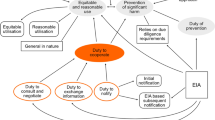Abstract
Developing countries such as Brazil, with limited track-records in dealing with environmental conflicts on a participatory basis, or whose legal frameworks establishing water resource management practices have been introduced only recently, need mechanisms that streamline and strengthen democratic negotiating and decision processes. Increasingly common worldwide, transferring water is developing into a specific source of disputes whose solutions are becoming significant, particularly in the developing countries. This paper analyzes the application of the strategic choice methodology in a dispute over transferring water between two river basins, which is a situation not covered by specific legislation in Brazil. This analysis leads to the conclusion that the application of this methodology is particularly relevant in cases such as this, where decisions are taken on an incremental basis over time, within a context of political, administrative and legal uncertainties.
Similar content being viewed by others
References
ANEEL (Agncia Nacional de Energia Elétrica), 2003, Superintendência de Estudos e Informações Hidrológicas, Ministério de Minas e Energia, Brasil.
Beder, S., 1999, Public Participation or Public Relations. In: BRIAN MARTIN (ed.), Technology and Public ParticipationWollongong, Australia: Science and Technology Studies, University of Wollongong, Wollongongpp. 169–192
Bennett, P., Cropper, S., and Huxham, C., 1998, Modelling Interactive Decisions: The Hypergame Focus. In Jonathan Rosenhead Rational Analysis for a Problematic World, John Willey & Sons, New York, Cap 12. p. 283–314.
Bingham, G., 1986, ‘Resolving environmental disputes: A decade of experience,’ Washington, DC Conservation Foundation: Donnelly and sons 1986.
Bredariol, C. and Magrini, A., 2003, Conflicts in Developing Countries: A Case Study from Rio de Janeiro. In Environmental Impact Assessment Review, 1 – pp 25.
Brundtland, G. H., 1987, Nosso Futuro Comum. Ed. Fundação Getulio Vargas, 1987.
Campos, J. D., 2001, Cobrana Pelo Uso da Água nas Transposi,ções da Bacia do Rio Paraíba do Sul Envolvendo o Setor Elétrico. COPPE, MSc Thesis at Universidade Federal do Rio de Janeiro. Rio de Janeiro.
Checkland, P., 1998, Soft Systems Methodology. In Jonathan Rosenhead: Rational Analysis for a Problematic World, Jonh Wilei & Sons., New York., p. 370.
Cox, W. E., 1999, Inter Basin Water Transfer. International Workshop on Interbasin Water Transfer, International Hydrological Programme, UNESCO, Paris.
Eden, C., 1998, Using Cognitive Mapping for Strategic Options Development and Analysis (SODA). In Jonathan Rosenhead: Rational Analysis for a problematic world, John Willey & Sons, New York, Cap. 2. p. 21–42.
Feldman, D. L. et al. 2000, Water Supply Challenges Facing Tennessee: Case Study Analyses And The Need For Long-Term Planning. Environment Policy Office, TDEC, Nashville, USA.
Friend, J., 1998, The Strategic Choice Approach. In Jonathan Rosenhead: Rational Analysis for a ProblematicWorld, – Problem Struturing Methods for Complexity, Uncertainty and Conflict, Jonh Wilei & Sons., New York, p. 367.
Friend, J. K. and Hickling, A., 1999, Planning Under Pressure: The Strategic Choice Approach. In Butterwood-Heinemann, Oxford.
Graf, Ana C. B. et al., 2000, Águas – Aspectos Jurídicos e Ambientais. Ed. Juruá. Curitiba: Brasil.
Hamacher, W., 1996, Environmental Conflict Management – An environmental policy instrument in developing countries. Deutsche Gesellschaft fr (Pilot Project Institutional Development in Environment,Eschborn 1 ed. 1, 66 p.
Hansen, J., 2000, Table Manners for Round Table – A Pratical Guide to Consensus. The Green Group/Juergen Hansen, Summerland, Canada.
Lanna, A. E., 1994, Instrumentos de gestão ambiental: métodos de gerenciamento de bacia hidrogrÁfica. Ministério do Meio Ambiente, IBAMA, Brasília, Brasil.
Magrini A. and Santos M. A., 2001, Gestão Ambiental de Bacias HidrogrÁficas, Instituto Virtual de Mudanas Globais, Rio de Janeiro, pp. 101–113. O modelo Brasileiro de Gerenciamento de Recursos Hídricos,
Mimi, Z. A. and Sawalhi, B. I., 2003, ‘A Decision tool for alloting the waters of the Jordan River basin between all riparian parties,’ Water Resour. Manag. 17, 447–461.
MME (Ministrio das Minas e Energia), 1985, Plano Nacional dos Recursos Hídricos: conceitos, políticas e diretrizes. Departamento Nacional de Águas e Energia Elétrica, Brasìlia, Brasil.
Mueller, C. C., 1999, Economia, Entropia e Sustentabilidade: Abordagem e Visões do Futuro da Economia de Sobrevivência. Instituto de Pesquisas Econômicas, USP out./dez., São Paulo, Brasil, 29, n. 4, p. 513–550.
Norgaard, R. B., 1997, O Crescimento da Economia Global de Trocas e a Perda de Biodiversidade. In: WILSON, E., Biodiversidade, Nova Fronteira, Rio de Janeiro, Brasil pp. 241–249.
Pellow, D. N., 1998, Negotiation and Confrontation: Environmental Policymaking Through Consensus Society & Natural Resources. California, textbf12, p. 189–203.
Rosenhead, J., 1998, Introduction: Old and New Paradigms of Analysis. In Jonathan Rosenhead (Coord.):. Rational Analysis for a ProblematicWorld, John Willey & Sons, New York. Cap.1. p. 1–20.
Sachs, I., 1993, Estratégias de Transição para o Século XXI: desenvolvimento e meio ambiente. Studio Nobel: Fundação de desenvolvimento administrativo, 1993.
Srdjevic, B., Medeiros, Y. D. P., and Faria, A. S., 2004 ‘An objective multi – criteria evaluation of water management scenarios,’ Water Resour. Manag. 18, 35–54.
Sternadt, Joseane de M. A., 1997 Utilização da Abordagem “strategic choice” para o Aperfeioamento de Um Centro de Prestação de Servicos. In Universidade Federal de Santa Catarina, Departamento de Engenharia de Produo,. Florianpolis, Brasil.
Tucci, C., 2001, Existe Falta de Água no Brasil?. In Jornal da Universidade, UFRGS, Porto Alegre, Ano IV,2001 p41.
Author information
Authors and Affiliations
Corresponding author
Rights and permissions
About this article
Cite this article
Carvalho, R.C.D., Magrini, A. Conflicts over Water Resource Management in Brazil: A Case Study of Inter-Basin Transfers. Water Resour Manage 20, 193–213 (2006). https://doi.org/10.1007/s11269-006-7377-3
Received:
Accepted:
Issue Date:
DOI: https://doi.org/10.1007/s11269-006-7377-3




